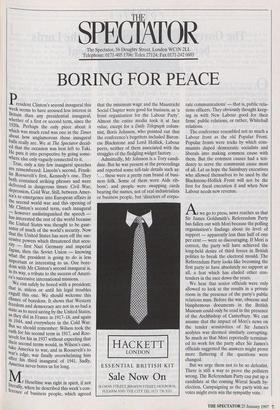SPECTATOR
The Spectator, 56 Doughty Street, London WC1N 2LL Telephone: 0171-405 1706; Telex 27124; Fax 0171-242 0603
BORING FOR PEACE
President Clinton's second inaugural this week seems to have aroused less interest in Britain than any presidential inaugural, Whether of a first or second term, since the 1920s. Perhaps the only piece about it which was much read was one in the Times about how unglamorous those inaugural balls really are. We at The Spectator decid- ed that the occasion was best left to Taki. He puts it into perspective by going some- where else only vaguely connected to it. True, only a tiny few inaugural speeches are remembered: Lincoln's second, Frank- lin Roosevelt's first, Kennedy's one. They both contained striking phrases and were delivered in dangerous times: Civil War, depression, Cold War. Still, between Amer- lea's re-emergence into European affairs in the second world war and this opening of Mr Clinton's second term, each inaugural however undistinguished the speech has interested the rest of the world because the United States was thought to be guar- antor of much of the world's security. Now that the United States has seen off the suc- cessive powers which threatened that secu- rity — first Nazi Germany and imperial Japan, then the Soviet Union — knowing w. hat the president is going to do is less important or interesting to us. Our bore- dom with Mr Clinton's second inaugural is, in its way, a tribute to the success of Ameri- ca's successive international missions. We can safely be bored with a president; that is, unless or until his legal troubles engulf this one. We should welcome this chance of boredom. It shows that Western freedom and democracy are not in so bad a state as to need saving by the United States, as they did in France in 1917-18, and again in 1944, and everywhere in the Cold War. But we should remember: Wilson took the oath for his second term in 1917, and Roo- sevelt for his in 1937 without expecting that their second terms would, in Wilson's case, take America to war, and in Roosevelt's to war's edge, war finally overwhelming him after his third inaugural of 1941. Sadly, America never bores us for long.
r Heseltine was right in spirit, if not literally, when he described this week's con- ference of business people, which agreed that the minimum wage and the Maastricht Social Chapter were good for business, as 'a front organisation for the Labour Party'. Almost the entire media took it at face value, except for a Daily Telegraph colum- nist, Boris Johnson, who pointed out that the conference's begetters included Baron- ess Blackstone and Lord Hollick, Labour peers, neither of them associated with the struggles of the fledgling widget factory. Admittedly, Mr Johnson is a Tory candi- date. But he was present at the proceedings and reported some tell-tale details such as: `. . . these were a pretty rum brand of busi- ness folk. Some of them wore Aids rib- bons'; and people were swapping cards bearing the names, not of real industrialists or business people, but 'directors of corpo- rate communications' — that is, public rela- tions officers. They obviously thought keep- ing in with New Labour good for their firms' public relations, or rather, Whitehall relations.
The conference resembled not so much a Labour front as the old Popular Front. Popular fronts were tricks by which com- munists duped democratic socialists and liberals into making common cause with them. But the common causes had a ten- dency to serve the communist cause most of all. Let us hope the Sainsbury executives who allowed themselves to be used by the Blackstone-Hollick Front will not be the first for fiscal execution if and when New Labour needs new revenue.
Awe go to press, news reaches us that Sir James Goldsmith's Referendum Party has fallen out with Mori because the polling organisation's findings about its level of support — apparently less than half of one per cent — were so discouraging. If Mori is correct, the party will have achieved the long-held desire of third forces in British politics to break the electoral mould. The Referendum Party looks like becoming the first party to have absolutely no support at all, a feat which has eluded other con- tenders in the race down the years.
We hear that senior officials were only allowed to look at the results in a private room in the presence of the party's public relations man. Before the war, obscene and blasphemous documents in the British Museum could only be read in the presence of the Archbishop of Canterbury. We can assume that the impact of Mori's news on the tender sensitivities of Sir James's acolytes was deemed similarly corrupting. So much so that Mori reportedly terminat- ed its work for the party after Sir James's officials suggested the answers might prove more flattering if the questions were changed.
But we urge them not to be so defeatist. There is still a way to prove the pollsters wrong. The Referendum Party can put up a candidate at the coming Wirral South by- election. Campaigning as the party with no votes might even win the sympathy vote.


































































 Previous page
Previous page